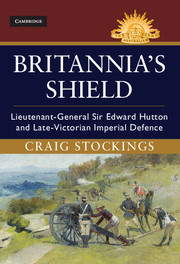Book contents
- Britannia's Shield
- Other titles in the Australian Army History Series
- Britannia's Shield
- Copyright page
- Dedication
- Contents
- Photographs
- Acknowledgements
- Introduction
- Chapter 1 ‘The common duties of the Empire’
- Chapter 2 ‘An intelligent and most active officer’
- Chapter 3 ‘I suppose he sent me a blister’
- Chapter 4 A ‘Trojan horse’ in the colony?
- Chapter 5 ‘One general policy – elastic as it may be’
- Chapter 6 ‘Making soldiers of them rapidly’
- Chapter 7 ‘I am here as one of yourselves’
- Chapter 8 ‘Pregnant of great results’
- Chapter 9 ‘Quite as much political and imperial, as it is military’
- Chapter 10 ‘Unfortunately not in touch or sympathy’
- Chapter 11 ‘Hopelessly ignorant of our self-governing Colonies’
- Chapter 12 ‘How far his vision ranged’
- Notes
- Bibliography
- Index
8 - ‘Pregnant of great results’: Canada and an imperial war, 1899–1900
Published online by Cambridge University Press: 09 March 2018
- Britannia's Shield
- Other titles in the Australian Army History Series
- Britannia's Shield
- Copyright page
- Dedication
- Contents
- Photographs
- Acknowledgements
- Introduction
- Chapter 1 ‘The common duties of the Empire’
- Chapter 2 ‘An intelligent and most active officer’
- Chapter 3 ‘I suppose he sent me a blister’
- Chapter 4 A ‘Trojan horse’ in the colony?
- Chapter 5 ‘One general policy – elastic as it may be’
- Chapter 6 ‘Making soldiers of them rapidly’
- Chapter 7 ‘I am here as one of yourselves’
- Chapter 8 ‘Pregnant of great results’
- Chapter 9 ‘Quite as much political and imperial, as it is military’
- Chapter 10 ‘Unfortunately not in touch or sympathy’
- Chapter 11 ‘Hopelessly ignorant of our self-governing Colonies’
- Chapter 12 ‘How far his vision ranged’
- Notes
- Bibliography
- Index
Summary
The sharp decline in Hutton's fortunes in Canada and a commensurate increase in interest in military affairs throughout the Empire corresponded with, and was dramatically hastened by, the outbreak of the Second South African War. The causes of the tensions between Britain and Transvaal that eventually led to war were long-running and numerous, including the lingering grievances and consequences of the war of 1881 and the illfated Jameson Raid of 1885–86, global alliance politics, the continuing ‘scramble’ for Africa and the economics of the diamonds and gold of the Witwatersrand. Sir Alfred Milner arrived as High Commissioner for Southern Africa and Governor of Cape Colony in May 1898 determined to further the British agenda of a union of southern African states under its control. He therefore took a hard line, determined to break Afrikaner power and aspirations. The catalyst for war was the issue of ‘uitlander’ rights. President Kruger feared that granting a full franchise to these expatriate immigrant workers, whose numbers were almost double those of Boer burghers in Transvaal, would threaten Boer independence. Chamberlain and Milner knew it, too – and pressed their diplomatic attack.
Throughout 1899, particularly in autumn, press outcries around the Empire concerning Boer ‘injustices’ inflicted upon the uitlanders gathered momentum, as did calls for the British Government to act. Tensions and discontent mounted on the Rand, mines closed and talk of war filled the air. A meeting between Milner and Kruger at Bloemfontein in early June 1899 solved none of the issues at hand. Three days later the decision was made in London to despatch an expeditionary force. Chamberlain admitted to Minto privately that with ‘the influence of Great Britain’ at stake, war was inevitable. Faced with a shifting balance of military power as British troops under Redvers Buller steamed towards Africa, Kruger issued his famous ultimatum to Whitehall demanding a recall of the ships, the removal of British troops already landed and the submission of the dispute to arbitration.
- Type
- Chapter
- Information
- Britannia's ShieldLieutenant-General Sir Edward Hutton and Late-Victorian Imperial Defence, pp. 173 - 198Publisher: Cambridge University PressPrint publication year: 2015

